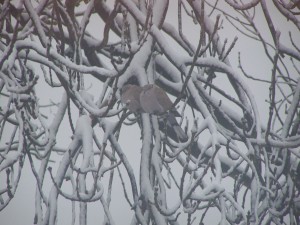POEMS BY JOHN IRVING CLARKE WITH THE ITALIAN TRANSLATION BY SILVIA PIO
READING OF THE POEMS BY THE AUTHOR HIMSELF
John Irving Clarke’ s poetry is a sharp blow to the reader’s conscience and goes straight to the point. There is always some natural scenery which, even in the urban and more damaged settings, has a delicate attention to details. There is always some domestic scenery which, in the framing of the awareness about life’s pain, lays emphasis to the emotions, the only salvation for the poet in a world of illness, old age, longing. But the lightness of irony and the richness of natural beauty are also included, so that these poems take in all the facets of human condition.
The poetry booklet “Softly in the Half-Light – Tenue in Mezza Luce”, published in England by Currock Press with the parallel Italian translation, is the outcome of a poetic correspondence and of a collaboration between the author and the translator, where the debate on the meaning of a poetic translation (an age-old one in the specialized fields) takes shades and turns which are quite unconventional, as it is written in the Foreword quoted below.
The joint work of John I. Clarke and Silvia Pio has lead to more writing and to a project, a poetic twinning organized by Margutte in Mondovì (where else?). Announcing this twinning, which will be covered later, we are now putting on-line some of the poems from the booklet, the ones published in the twinning anthology “Da terre a terre”.
From Jimmy Andrex’s Foreword:
«… Each translation is a new creation, taking the original as its starting point, using the target language to set off new meanings unknown to the original author…
Translations of poems are a creative challenge to us all. When we read poems are we looking for the “meaning”, or do we see poetry as a means by which we can, through language, explore life beyond the literal and obvious?
It’s interesting playing linguistic games with the two versions of each poems in this collection. For instance, even a glance at the titles throws up tensions in translation that hint at the world in-between the meanings. John Irving Clarke uses the gerund (“-ing”) in three out of seven poems which Silvia Pio chooses to avoid. Consequently, the English suggests movement and action whereas the Italian tends towards stillness and contemplation.
Another one is simply to read the Italian and listen to the sounds to see what sounds come out. One doesn’t need to be a linguist, just sound every vowel and have a ball, reader. Any subsequent desire to eat linguine and watch Ennio Morricone movies will be nothing to be embarrassed about…»
Margutte has already published a short story by John I. Clarke: http://www.margutte.com/?p=1912&lang=en
At The Water’s Edge
Here a pewter grey finger feels its way
from a deep Pennine recess, the Calder
curls around this sometime gravel pit this
sometime reserve beyond the motorway
growl. Here the April wind bites and harries
fancies of spring, fancies of something
warmer than this.
The rolling year’s inevitable doubt
surrounds us, we are neither here nor there,
watching adult moorhens, three fluffed up chicks,
from the opposite bank to where the swans
once made their applauded and pillaged spread,
brave the choppy wash, dip into the wild
wide space, calm and tremulous.
The slow slap at the water’s edge whispers
what next
like the time you placed my hand
on your bare breast
to see if I could feel the lump
that you found lurking there.
Visiting
It’s the persistence of the fly which draws attention.
Tired now, in an armchair all his own
he feels again the fly settling on a wizened wrist
and aims a slow motion swipe,
smiling foolishly at the tragic parody
of what had been impossible in youth.
Lurching on, the clock pointer
draws deeply on each minute. Kitchen walls shadow
the hissing gas fire, crowding the remains
of conversation, as daylight fades to grey.
It’s the driven departure that tears,
the thousand miles of tarmac leading beyond
the beloved vale, the blue remembered…
beyond the land that time forgets.
Memories are thrown into a heap like cones
collected after digging up a road.
Wind turbines have ceased their syncopation,
smiling at the sky like full-headed dandelions
gone to seed
waiting.
Comparing Notes
I want to let you know
the great tits have returned.
Over the winter
noting the warp of the wood
I tacked on some roofing felt
to ward off the worst
and now they’re back
flitting into the cherry tree
checking all is well
darting into the box.
Last year they raised three chicks
tumbling out of the hole
fleeing in sequence
to safety.
Tee-cher, tee-cher.
In the killing fields of magpies
the parents claimed success
tee-cher, tee-cher.
E-mails, twitter, texting, skype.
There are so many ways
to let you know
the great tits have returned
perhaps I should drop you a note.
Softly in the Half-Light
Last night you slipped into my room
like a moonbeam checking in.
Slow pannning across a shelf of books,
flooding the photographs in frames,
sitting on a corner of the bed.
Everything’s alright, you said.
Everything’s alright.
As you left the mattress did not sigh,
the floorboards did not creak,
nor did you turn and say,
you were never coming back.
Never coming back.
(This article was published for the first time on 5 October 2013)



